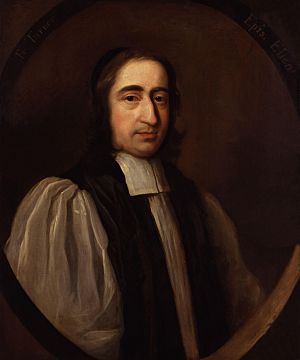Francis Turner (bishop) facts for kids
Quick facts for kids The Right Reverend Francis Turner |
|
|---|---|
| Bishop of Ely | |

Portrait by Mary Beale
|
|
| Diocese | Diocese of Ely |
| Reign ended | 1690 |
| Orders | |
| Ordination | 1683 |
| Personal details | |
| Born | 23 August 1637 |
| Died | 2 November 1700 London, England |
| Denomination | Church of England |
| Alma mater | New College, Oxford |
Francis Turner (born 23 August 1637 – died 2 November 1700) was an important English church leader. He became the Bishop of Ely. He is known for being one of the "seven bishops" who spoke out against King James II. He also refused to promise loyalty to King William III. This decision meant he lost his position.
Contents
Early Life and Education
Francis Turner was the oldest son of Thomas Turner, who was the Dean of Canterbury. His mother was Margaret, daughter of Sir Francis Windebank. Francis was born on August 23, 1637. He was likely born in Southwark or Reading, England.
His younger brother, Thomas Turner, later became the president of Corpus Christi College, Oxford. Francis married Anna Horton in 1676, but she passed away before him.
Francis went to Winchester College and then to New College, Oxford. He earned his first degree in 1659 and a master's degree in 1663.
Church Career and Important Roles
Francis Turner's career in the church grew because of the Duke of York (who later became King James II). Turner served as the Duke's personal chaplain. In 1664, he became the rector of Therfield, a church in Hertfordshire.
He continued his studies at St John's College, Cambridge. In 1669, he earned his Doctor of Divinity degree from Oxford. He then became a church official at St Paul's Cathedral.
In 1670, he became the Master of St John's College, Cambridge. This was a very important leadership role. He also served as the vice-chancellor of Cambridge University in 1678.
Becoming a Bishop
In 1683, Francis Turner became the Dean of Windsor. Later that year, he was made the Bishop of Rochester. This meant he was a senior leader in the Church of England. In 1684, he became the Bishop of Ely.
He preached the sermon at King James II's coronation in 1685. He also helped James Scott, 1st Duke of Monmouth before his execution in July 1685.
Standing Up to the King
Francis Turner was one of the "seven bishops" who famously stood up to King James II. The King wanted to make new laws about religion without the approval of Parliament. The bishops believed this was wrong and petitioned against his "Declaration of Indulgence." For this, they were arrested but later found not guilty.
After King James II was replaced by William III, Turner faced another difficult choice. He was one of nine bishops who refused to take an oath of loyalty to the new king. This was part of a movement called the Nonjuring schism. Because he refused the oath, he lost his position as Bishop of Ely in 1690.
Later Life and Legacy
Francis Turner passed away in London on November 2, 1700. He was buried in the church at Therfield. He left all his belongings to his daughter, Margaret.
Turner is an ancestor of Henrietta Euphemia Tindal, a poet and novelist from the 1800s. He is also connected to the Tindal-Carill-Worsley family.
Writings by Bishop Turner
Besides some sermons, Francis Turner also published:
- Animadversions on a Pamphlet entituled "The Naked Truth" (1676)
- Letters to the Clergy of the Diocese of Ely (1686)
A portrait of Francis Turner, likely painted by Mary Beale, is now in the National Portrait Gallery. He also appears in a group portrait of the seven bishops at the same gallery.
See also
 | Sharif Bey |
 | Hale Woodruff |
 | Richmond Barthé |
 | Purvis Young |

